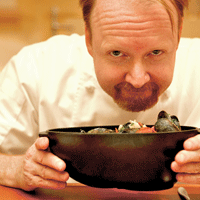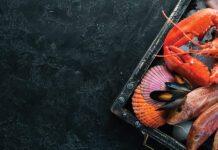 Most restaurants operate with the idea that quality and safety are paramount considerations when choosing the food they serve to their customers. But, as Canadians become increasingly conscious and informed about environmental issues, they are demanding chefs approach ingredient purchases ethically, too. But, that’s not as easy as it sounds, especially when it comes to seafood.
Most restaurants operate with the idea that quality and safety are paramount considerations when choosing the food they serve to their customers. But, as Canadians become increasingly conscious and informed about environmental issues, they are demanding chefs approach ingredient purchases ethically, too. But, that’s not as easy as it sounds, especially when it comes to seafood.
A decade ago, when scientists warned that Atlantic fish stocks were being rapidly depleted, aquaculture was touted as the saviour of the industry. Many chefs switched to farmed fish. But then along came reports stating poor aquaculture was, in fact, destroying the ocean environment — pollution, disease and interbreeding with wild stock were just a few concerns. “Back to the wild!” was the cry.
But the news got worse; even more species were being threatened with extinction due to overfishing. What’s a responsible restaurateur to do? There is help.
The U.K.-based Marine Stewardship Council (MSC) works with fisheries around the world to ensure wild-caught fish are sustainably harvested. Participating fisheries have to demonstrate they maintain sustainable fish stocks and minimize environmental impacts. And, the MSC eco-label is helpful to determine the sustainability of some fish. In addition, Sea Choice, an initiative of the Monterey Bay Aquarium in the U.S.A. (supported by the David Suzuki Foundation) and Ocean Wise (an initiative of the Vancouver Aquarium in Canada) have made it their mission to spread the word on sustainability.
Mike McDermid, Ocean Wise partner relations manager at the Vancouver Aquarium, acknowledges the difficulties in sorting through the issues. “We’ve come to a level of understanding in protecting the land; we have national parks and ecozones, and we talk about protecting the wilderness and wildlife,” he says. “But there’s a difference in the way we approach the oceans. We talk about fish stocks and the need to manage them as if they were cattle.
We have to see the oceans as a wilderness and its animals as wildlife, which needs protecting.”
Perhaps the public disconnect is understandable. A November 2010 study from the Chicago-based research firm Technomic found that, while Canadians understood reasonably well the concepts of local, organic and natural foods, only 25 per cent felt they understood the meaning of sustainable. This is especially true for sustainable seafood.
According to McDermid, many species are down to the last 10 per cent, and they’re still being fished heavily. In the face of resistance from some governments, organizations such as Sea Choice and Ocean Wise have rallied chefs and consumers to take action by refusing to buy these products.
“Chefs have huge power to educate,” says Ted Corrado, executive chef at C5 Restaurant at the Royal Ontario Museum in Toronto. “When a customer asks why we don’t serve tiger shrimp or Chilean sea bass, I come out and explain it to them. And, they usually get it.” Instead, he serves spot prawns with cucumber and avocado gazpacho, sea asparagus and salmon caviar ($15). Indeed, many restaurant-goers are actually seeking out chefs offering ethical choices. Both Sea Choice and Ocean Wise offer a free mobile phone app, which allows consumers to check whether their seafood choices are sustainable. The latter even offers a list of participating Canadian restaurants serving sustainable seafood.
In fact, it was two customers from British Columbia a few years ago who brought Corrado into the then fledgling Ocean Wise program. “They asked me what items on the menu were sustainable,” he says. “I had no idea, but I was on the phone to Ocean Wise the next day.”
Finding suppliers was his next hurdle. Back then, few sold sustainably harvested seafood or were able to certify what they sold. But the power of chefs, and their demand for accountability, has changed the landscape. Many suppliers are working with Ocean Wise and the MSC to provide sustainably caught seafood, and as more and more chefs become involved, the availability and price keep improving. Already, Ocean Wise lists a significant number of suppliers from coast to coast who are embracing the message and offering sustainable choices — from small scale operations such as Toronto’s Fisher Folk to the giants of the industry, distributors such as Gordon Food Service in Ontario and B.C., and Sysco in B.C.
Ensuring seafood is actually sustainably caught is the challenge. As one chef scoffed, “You have to be careful. Some guys will tell you what you want to hear: ‘Yeah, sure, it’s sustainable.’” But good distributors, such as Vancouver-based Albion Fisheries, track the products they sell. Working with MSC and Ocean Wise, they ensure the sustainable seafood they provide is certified. This means it has been harvested in ways that don’t harm the environment. How can they be sure? The tracking process allows them to track who caught the fish and where and how it was caught. If the fishermen deviate from the rules, they lose their certification.
Even without tracking, Guy Dean, vice-president and chief sustainability officer for Albion, says it’s often easy to tell the difference; fish caught in a net is usually bruised and damaged from being bumped and pressed into the net, while the scales and flesh of line-caught fish are usually pristine.
And, therein lays the difference, according to Robert Clark, executive chef at C Restaurant in Vancouver and a founding member of Ocean Wise. It’s the quality, says the toque. “I loved Chilean sea bass. I served it all the time. But a number of years ago, I began to notice the quality was getting worse and the size was smaller,” he says. “I discovered the species was being destroyed and younger fish were being poached illegally.” He searched for a replacement and found it in sablefish, “a beautiful fish and a perfect replacement for sea bass.” The curious result? Word got around, and more diners began to frequent C Restaurant to enjoy quality sustainable options such as roasted sablefish with lobster gnocchi, chanterelles and lemonade foam ($37) or Larry Albright’s trout with squash risotto, haricots vert and almond-buttered sprout leaves ($35).
Martin Kouprie, chef and co-owner of Pangaea, in Toronto, echoes Clark’s sentiments. “It used to be we’d get fish so bruised you had to use it right away. The better product also means a longer shelf life, so any extra cost is definitely worth it.” He believes every ingredient has a story and his menu tells it — laughing bird shrimp, Mediterranean sea bass, Dungeness crab, wild harpoon caught swordfish, diver scallops. Like Clark, he’s found the quality is reaping results. “Of the last 100 people we had for dinner, only one didn’t order seafood.”
Nonetheless, many chefs are still reticent. They see sustainable seafood inevitably leading to higher cost and less profit in an industry that already operates on very tight margins. But, for many seafood species, the cost is the same or similar. While it’s true sustainable shrimp, such as spot prawns, cost more than eco-destroying, farmed tiger shrimp from Asia, and diver scallops — which are harvested without dredging the sea floor, at double the price — there are many sustainably farmed varieties of each, which are almost the same price for superior quality.
More importantly, chefs serving sustainable seafood have little trouble filling their restaurants. “Being white tablecloth, many people dismiss our goals as elitist,” Clark laughs. “But we sell only seafood, so we have a vested interest in serving really high quality and in ensuring what we sell doesn’t run out — or we’ll have a dead business.”
But do all pro-sustainability operators run white tablecloth restaurants? A quick look at the Ocean Wise restaurant list might surprise those who think the program is elitist. There are indeed fine-dining establishments involved in the cause, but you’ll also find ethnic spots such as Sakura Mango Japanese restaurant in Quebec City or Popaddoms Taste India! and Piato Estiatorio (Greek cuisine), both in Vancouver. And there are pubs, like Ryan Duffy’s in Halifax, whose menu is dotted with Ocean Wise logos on dishes such as scallops bouillabaisse made with seared Ray de Leon diver-caught scallops on a Pernod vegetable ragout, with a rouille baguette ($18). Even that pub staple, fish and chips, is being prepared with sustainably caught species at pubs like Toronto’s Brazen Head Irish Pub (cold water caught, Cape Capensis whitefish fillets in Kilkenny Cream Ale batter with hand-cut chips and coleslaw, $15) or the Red Card Sports Bistro in Vancouver (Lager-battered ling cod with chips, house-made tartar sauce and fresh cabbage slaw and a battered pickle, $15). For these chefs there’s an ethical override to any price difference.
Across the country, foodservice is joining the fray. Chains such as Earls, Joey’s, Cactus Club Café and Bento Sushi are moving to sustainable menus. “We have been able to demonstrate that making sustainable choices, regardless of the size of your operation is achievable,” says Christy Murphy, the Vancouver-based Cactus Club Café’s director of Marketing. The ever-expanding 20-restaurant chain is able to use its buying power to make changes. “We have been able to encourage suppliers to provide more sustainable products.” Rob Feenie’s signature Tuna Tataki is made with locally caught, seared albacore tuna served with green papaya slaw, orange, avocado, pine nuts and yuzu vinaigrette ($14).
Universities and colleges across Canada have also joined Ocean Wise — from Memorial University in St. John’s, N.L., in the east, to the University of British Columbia in the west. Indeed, the student menus at the Bamfield Marine Sciences Centre in British Columbia are 100 per cent Ocean Wise. Even smaller institutions a long way from either ocean — schools such as Sault College in Sault Ste. Marie, Ont. or St. Paul’s College in Winnipeg — have joined the Ocean Wise program.
Compass Group Canada runs the foodservice programs in many colleges and universities, including Bamfield’s. This year it joined Ocean Wise in an initiative that will replace a quarter-million pounds of unsustainable Atlantic cod annually with more sustainably fished Alaskan Pollock.
The impact large-scale caterers such as Compass can make is significant, says McDermid, “[It’s] a huge company and the volume of product is a major concern for them, but its commitment is a huge flag around which others could rally.” In a statement, Jack MacDonald, then CEO of Compass Group Canada, said, “Our purchasing shift can make a significant impact, and it is clearly the right thing for us to do.”
For most chefs and operators it comes down to doing the right thing, and Ocean Wise and its network of suppliers is trying to make it easy to do that. On the list are suppliers of both wild-caught and sustainably farmed fish, making it easy for chefs to make choices. “We’re chefs, we’re not marine biologists,” Kouprie suggests. “But the marine biologists are making the information available. We have to use it.”
McDermid is encouraged by the astounding growth of Ocean Wise and the response of chefs in particular. He sees an opportunity to reverse the trend toward the kind of species destruction that humankind seems particularly prone to carry out. “Seafood represents the last commercial wild hunt on the planet, and we’ve pretty much wiped out everything we’ve ever hunted,” says McDermid sadly. “The foodservice industry represents a huge opportunity to educate consumers and make sure it doesn’t happen again.”
More in Feature Articles:
Fishing For Dollars: How to Reel In Today’s Cautious Customer
The Pressure Cooker: Government Puts Pressure on Foodservice Operators
Misunderstood: Microwaves in Foodservice
A Rosy Outlook: Profiling Chef Rose of the Drake Hotel




















